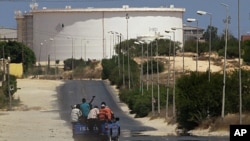As Libyan rebels advance closer to the center of Moammar Gadhafi’s government in Tripoli, U.S. defense officials say the Libyan leader’s future prospects are looking dim.
Libyan rebels and pro-government forces are fighting fierce battles in an oil refinery just 50 kilometers west of Libya’s capital Tripoli, as rebels report capturing towns elsewhere in the west and south.
Tripoli remains the seat of Libyan leader Moammar Gadhafi’s goverment as the months-long popular uprising continues to seek his removal.
In his first briefing with Pentagon reporters, Defense Secretary Leon Panetta’s spokesman George Little said Wednesday that the indications on the ground show Mr. Gadhafi’s exit may come sooner rather than later. “If you put all of those things together, the future doesn’t look particularly bright for Gadhafi, but you know, we’ll have to see where things go. The secretary said that Gadhafi’s days are numbered, but neither he nor I can put a precise number on how many days," he said.
In addition to the rebel advances, Little credited recent high-profile defections from the Gadhafi government, as well as sustained pressure from NATO operations and from economic and diplomatic sanctions, with contributing to what analysts expect will be Mr. Gadhafi’s eventual ouster.
Reza Jan is a Research Analyst for the Critical Threats Project at the American Enterprise Institute.
He tells VOA that he believes the rebels reaching Tripoli will just be the beginning for the next violent phase in the Libyan crisis. “They’ve made some astonishing advances in the last few days, but it really remains to be seen what happens once they get closer to Tripoli because the fight is far from over," he said.
Jan says that based on intelligence from the capital, there still is a lot of support for Mr. Gadhafi in the city. He says this will most likely lead to bloody battles in the streets of Tripoli.
He also says that despite the months-long NATO campaign against Mr. Gadhafi’s government, there does not seem to be a breakdown among his military forces.
There also does not seem to be a clear path to peace through diplomacy. On Tuesday, the rebels dismissed reports that they held talks with aides to Colonel Gadhafi.
Jan says that at this stage, this does not surprise him. “If Gadhafi were to make a deal, I don’t think he would do it until he was absolutely sure that victory was impossible or that survival was impossible. And I don’t think that’s necessarily the case yet," he said.
But he does think the situation is moving in the right direction for talks. “It’s coming close. I mean, we’ve been approaching that point for some time now. It’s been much slower than any of us I think would have appreciated or would have desired. It’s difficult to say exactly how long it’s going to take to get there," he said.
As they moved in from the west late last week, rebel fighters made their closest approach to the capital since the early weeks of the uprising.
If Libyan rebels are successful in cutting off Tripoli from the western part of the country, it would remove one of the few sources of fuel for Mr. Gadhafi’s troops and people in the capital.
US Defense Officials Say Future ‘Not Bright’ for Gadhafi
- By Sean Maroney




